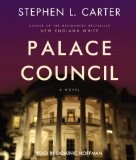Palace Council, by Stephen L. Carter (Read by Dominic Hoffman)
This book is one part thriller, one part social commentary and one part historical analysis. All the parts add up to a very satisfying and thought-provoking third novel for the author of Emperor of Ocean Park and New England White. Leaving the engagement party of his former girlfriend, Eddie finds the body of a prominent white man on the grounds of one of Harlem's landmarks. Even more puzzling than the incongruity of finding a white man in 1950s Harlem is Eddie's discovery of an unusual cross in the dead man's hand. Able to move freely between the racially diverse worlds of his birth and his literary celebrity, Eddie learns that the cross figures mysteriously in the lives of some of his close associates, their friends and several prominent people of the time. His sister's social activism and her disappearance at the beginning of a succession of militant, radical protests of the 60s also baffles Eddie. As his literary achievements win him recognition and entree to elite levels of society, he unearths frightening connections that lead from Harlem's crime scene through upper-crust society (both black and white), all the way to the White House.
Aside from creating an intriguing, complex plot with carefully developed characters who live on in the listener's mind long after the final credits, Carter has peopled his book with recognizable figures and events of the 20th century. It is impossible to become immersed in this book and not speculate about the happenings portrayed or the conversations reported. In an intimate, unguarded moment, Nixon shares with Eddie his despair over the outcome of Watergate. In other instances, Langston Hughes discusses the multi-level strata of black culture, and J. Edgar Hoover offers personal justifications for some of his more extreme measures.
This audio book offers a unique examination
of the period of time from 1954 to 1974 in America,
with its emergence of militant protest groups, the growth
of the Civil Rights movement, our involvement in Vietnam,
the Watergate scandal, and various Cold War concerns.
Eddie Wesley coins the term "the Darker Nation,"
to describe the position his black brethren occupy in
that world and he uses his status as a celebrated and
respected author to report and comment on the people
and events of the time. Through his descriptions of
conspiracies, murders and shady politics we see that
violence, corruption, graft, greed and ambition were,
and continue to be, color blind. An engaging thriller
with just the right touch of romance, social awareness
and artistic insight-highly recommended.
Ruth
Mormon
12/22/09

